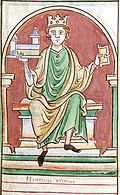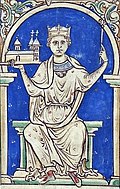UK Constitution and Government/Normans
William I
[edit | edit source]
The course of English political, legal and cultural history was changed in 1066, when William, Duke of Normandy (also called William the Conqueror) successfully invaded the nation and displaced the Saxon king, Harold II.
In 1066 King Edward, also called St Edward the Confessor, died. His cousin, the Duke of Normandy, claimed that the childless King had named him heir during a visit to France, and that the other claimant to the throne, Harold Godwinson, had pledged to support William when he was shipwrecked in Normandy. The veracity of this tale, however, is doubtful, and Harold took the crown upon King Edward's death. William, however, invaded England in September, and defeated (and killed) Harold at the famous Battle of Hastings in October.
William II
[edit | edit source]In 1087, King William I died, and divided his lands and riches between his three sons. The eldest, Robert, became Duke of Normandy; the second, William, became King of England; the youngest, Henry, received silver. Henry, however, eventually came to possess all of his father's dominions. William II died without children, so Henry became King. Henry later invaded Normandy, imprisoned his brother, and took over the Duchy of Normandy.
Henry I, Stephen and Matilda
[edit | edit source]Henry, whose sons had predeceased him, took an unprecedented step: naming a woman as his heir. He declared that his daughter Matilda would be the next Queen. However, Matilda's claim was disputed by Stephen, a grandson of William I in the female line. After Henry I died in 1135, Stephen usurped the throne, but he was defeated and imprisoned by Matilda in 1141. Later, however, Matilda was defeated, and Stephen took the throne.
Matilda, however, was not completely defeated. She escaped from Stephen's army, and her own son, Henry Plantagenet, led a military expedition against Stephen. Stephen was forced to agree to name Henry as his heir, and when Stephen died in 1154, Henry took the throne, commencing the Plantagenet dynasty.





